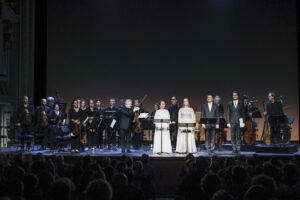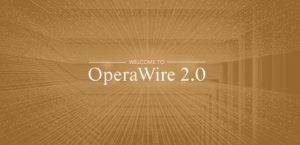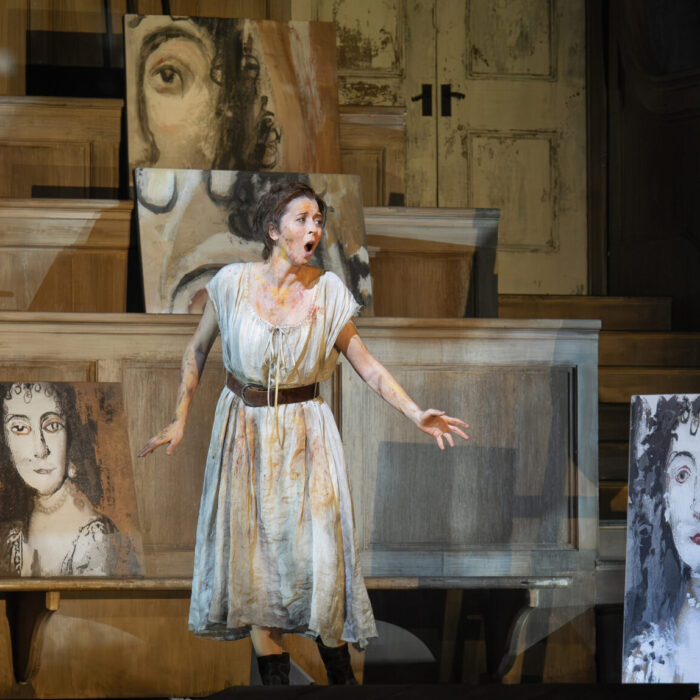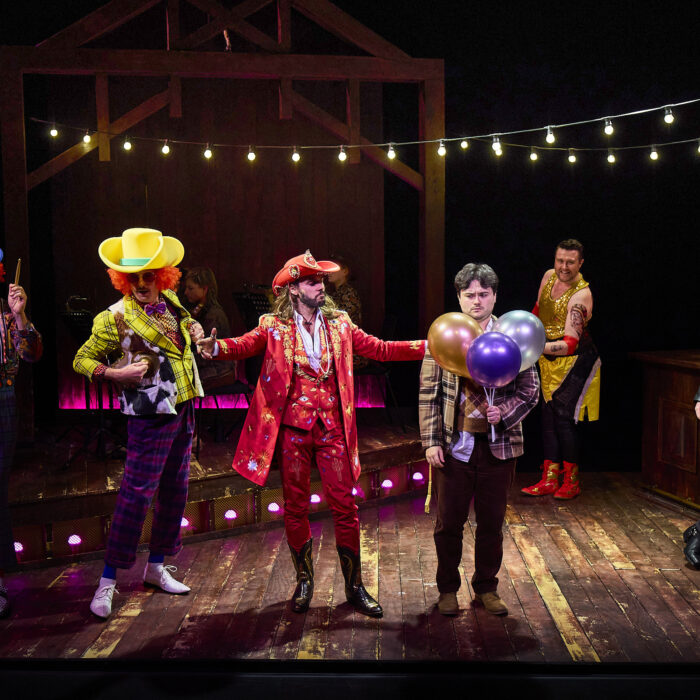
Opéra national du Rhin in Strasbourg 2025-26 Review: Le Triomphe du Temps et de la Désillusion
By Andréas Rey
To start its 2025-2026 season, the Strasbourg Opera House welcomed the ensemble Les Accents with sopranos Mélissa Petit and Julia Lezhneva, countertenor Carlo Vistoli, and tenor Krystian Adam for a concert version of “Le Triomphe du Temps et de la Désillusion” on September 14, 2025.
The concert version does not preclude the use of scenery, in this case essentially a projection of crumpled fabric, royal blue or crimson red in color, whose folds reveal those of a vagina, thereby emphasizing the baroque nature of the work and the fact that its drama is played out in a woman’s psyche.
The ensemble, Les Accents, led by its violinist and conductor Thibault Noally, played each scene with great fluidity and dexterity, like Christ’s stages and moments of maturation. Sometimes lively, sometimes melancholic, even nostalgic, the music here conveys every psychological movement of its unique character, both setting and actress of the action, thus heralding future Italian operas. Nevertheless, thanks to the transparency of the orchestra, the audience could also hear echoes of Vivaldi in the structure of the violin concerto, and Monteverdi in the limited number of instrumentalists and in the description of time, almost identical to that of Time in The Return of Ulysses to his Homeland. The ensemble Les Accents, and in particular its cellist, theorbo player, and oboist, brought out the richness of a score that foreshadowed Handel’s future masterpieces, such as his oratorios, his operas, notably the seria, and a large part of his orchestral development.
In addition to the quality of the orchestra, the singers’ techniques deserve praise here. The countertenor Carlo Vistoli as Disillusion, whose range is a happy medium between that of sopranos and tenors, is very interesting, especially in the recitatives such as in his ‘Folle, tu nieghi il Tempo, e in quest’ora’ or his arias such as ‘Chi già fu del biondo crine,’ although he does not quite succeed in conveying emotion and leaves the audience wanting more. The same is true of the tenor Krystian Adam as Time, who, although successful in his arias, such as ‘Urne voi, che racchiudete tante belle,’ and his recitatives, such as ‘Te credi che sia lungi, e il Tempo è teco’ acts more as a narrator than a character. Their duets seem slightly cold and disembodied, as in ‘Il bel pianto dell’aurora.’
The sopranos, meanwhile, are much more embodied and expressive in their singing. Soprano Mélissa Petit as Beauty, and above all as a woman who, with age, turns away from fleeting pleasures and therefore also from physical beauty, to concentrate like a nun on her psyche and withdrawal, holds her vocal line very firmly and straight, with an inner tremor, a touching crack, on which maturation can take place. The amateur will love the transition from her very cheerful and joyful ‘Fido specchio in te vagheggio’ to the darker and more doloristic ‘Voglio cangiar desio.’
But it is undoubtedly soprano Julia Lezhneva as Plaisir who succeeds not only in touching, but also in impressing, maintaining a crystalline timbre that highlights the youthfulness of pleasure when the main character still clings to it, and impressing with her mastery of the demands and pirouettes of her role. Amateurs will love her ‘Fosco genio, e nero duolo’ as well as her ‘Tu giurasti di mai non lasciarmi.’ Another success for this singer who is well versed in the Baroque repertoire.
Their duets are undoubtedly the most enchanting in this opera, such as ‘Il voler nel fior degl’anni’ thanks to their embodiment, their freshness, and their joy.
This was another wonderful evening at the Strasbourg Opera House.



